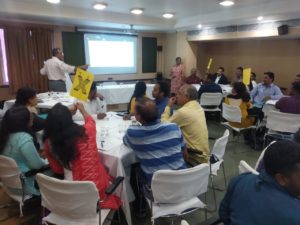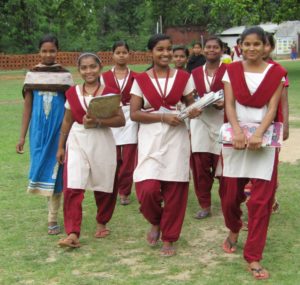 Girls’ Education is the strategic development priority in CYSD’s Integrated Tribal (Child) Development Project interventions in both Keonjhar and Mayurbhanj districts of Odisha. The findings of different studies reflect that girls as compared to boys are disadvantaged and discriminated in education, health and other aspects. Most of the girls in tribal dominated programme areas are dropped out from the secondary schools due to various reasons, like they are compelled to do household chores and take care of their siblings in one hand and the distance between their houses and the schools, and lack of girls’ toilet facilities in school campus on the other.
Girls’ Education is the strategic development priority in CYSD’s Integrated Tribal (Child) Development Project interventions in both Keonjhar and Mayurbhanj districts of Odisha. The findings of different studies reflect that girls as compared to boys are disadvantaged and discriminated in education, health and other aspects. Most of the girls in tribal dominated programme areas are dropped out from the secondary schools due to various reasons, like they are compelled to do household chores and take care of their siblings in one hand and the distance between their houses and the schools, and lack of girls’ toilet facilities in school campus on the other.
Now, CYSD has been focusing on gender transformative programme activities putting special emphasis on mass awareness to promote girls’ education, campaign on enrollment of girls in schools, capacity building of girls on child rights and protection, and orientation on school sanitation and personal hygiene etc.
In this initiative, girls’ education goes beyond getting them into school. The process ensures that girls learn and feel safe while in school; learn the socio-emotional and life skills necessary to navigate and adapt to a changing world; and take decisions about their own lives. Some of the key achievements are highlighted below:
188 SMC members Sensitized on Right to Education (RtE)
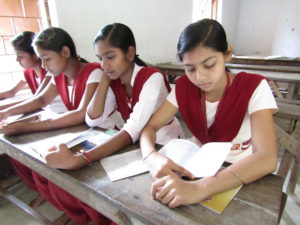 From10 targeted schools, 188 members of SMC – School Management Committee (including 78 female members) are oriented on Right to Education (RtE) Act and made aware about their roles and responsibilities, especially in designing school development plan, monitoring the school activities regularly with special focus on effective learning environment for girls at schools.
From10 targeted schools, 188 members of SMC – School Management Committee (including 78 female members) are oriented on Right to Education (RtE) Act and made aware about their roles and responsibilities, especially in designing school development plan, monitoring the school activities regularly with special focus on effective learning environment for girls at schools.
1320 Girls using WASH facilities in 10 Schools of Thakurmunda Block:
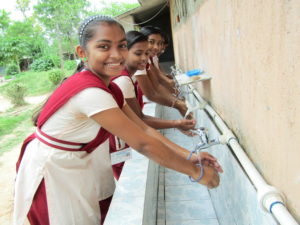 In 10 schools of Thakurmunda block, CYSD has facilitated the renovation of separate toilets for girls, handwashing platforms and tube wells for drinking water purpose leveraging resources from the Block Administration. Around 1320 girls are using the upgraded Water Sanitation and Hygiene (WASH) facilities hassle-free.
In 10 schools of Thakurmunda block, CYSD has facilitated the renovation of separate toilets for girls, handwashing platforms and tube wells for drinking water purpose leveraging resources from the Block Administration. Around 1320 girls are using the upgraded Water Sanitation and Hygiene (WASH) facilities hassle-free.
1164 Adolescent Girls fortified with improved knowledge on Life Skill Health Education & ASRH:
Towards ensuring improved understanding of adolescent girls, around 1164 girls are oriented on life-skills health education along with the components of adolescent sexual and reproductive health (ASRH), RTI, STI and HIV/AIDS. Besides, 124 girls from 10 schools of Thakurmunda block are imparted training on key aspects of life skills, like Yoga, leadership, problem-solving, decision making, creative writings and presentation skills.
1128 Girls are Digitally Literate through Digital Literacy campaigns at School level:
The digital literacy campaign of CYSD through World on Wheel (WoW) initiative envisaged to drive a long way towards creating digital learning environment in rural-tribal schools. WoW – a bus equipped with 20 computers, a large LCD screen and internet connectivity has demonstrated an overwhelming response from the students, teachers and parents including the government officials. As of now 1128 girls are equipped with computer knowledge. Teachers are digitally trained and emphasising on the basics of digital literacy and numeracy skills in course curriculum, where girls will have active participation.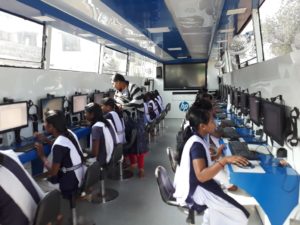
As an impact of the above initiatives, the learning environment has become healthy, secure, protective and inspiring one for the girls. On the behavioural part, girls respecting to each other and the surrounding as well. The school administration process seems quite transparent – the headteacher and the SMC are treating the assistant teachers with respect. The schools have clear guidelines to ensure quality education for girls. Moreover, two schools are recognised with Swachh Vidyalaya Puraskar; girls in schools are now rewarded for their talents in different events at Block, District and State levels. Two schools, consecutively for last two years, have shown more than 96% pass results in Std. X examination.
 My experience in CYSD, a more than three and half decades old development organization, is only 6 months. I got the chance to work with such a huge organization that I have never worked with before. Here in CYSD, there are great opportunities to advance one’s career. The organization offers the benefits learning ethical values and provides the chance get socialized with its line institutions through field studies.
My experience in CYSD, a more than three and half decades old development organization, is only 6 months. I got the chance to work with such a huge organization that I have never worked with before. Here in CYSD, there are great opportunities to advance one’s career. The organization offers the benefits learning ethical values and provides the chance get socialized with its line institutions through field studies.
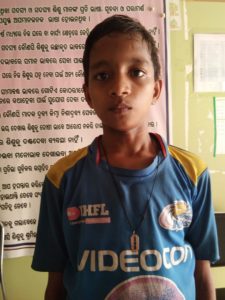 Somanath’s uncle being a drunkard, many a times tortured him and forced him to earn instead of going to school. The life of six years old boy was overwhelming due to loneliness and unsecured condition. Since Khairput block comes under CYSD’s Integrated Child Development Programme operational area, its Child Protection Coordinator got to know the incident and started investigation on the issue.
Somanath’s uncle being a drunkard, many a times tortured him and forced him to earn instead of going to school. The life of six years old boy was overwhelming due to loneliness and unsecured condition. Since Khairput block comes under CYSD’s Integrated Child Development Programme operational area, its Child Protection Coordinator got to know the incident and started investigation on the issue.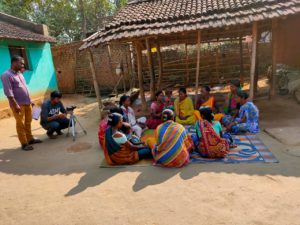 (A)With a view to enhance the exposure the Pregnant and Lactating mother (PLWs) and their male counterparts to SAMVAD led videos/films, the team has formulated a strategy to map a list of all the PLWs and married couples in all the project villages and screening the MIYCN videos regularly for better uptake of information. As a result, dissemination participation has increased from 30-40%.
(A)With a view to enhance the exposure the Pregnant and Lactating mother (PLWs) and their male counterparts to SAMVAD led videos/films, the team has formulated a strategy to map a list of all the PLWs and married couples in all the project villages and screening the MIYCN videos regularly for better uptake of information. As a result, dissemination participation has increased from 30-40%.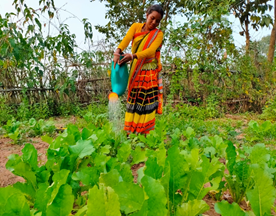 (B)Winter is one of the best seasons to cultivate kitchen garden at the household level. So most of the women have undertaken kitchen gardening in their respective backyards choosing the best plant species for growing vegetable year the round to ensure supply of required vegetables to their families for consumption and supplementary nutrition purposes. The video disseminations greatly help the women to address the important aspects of an ‘Ideal Kitchen Garden’, like selection of right species, usages of compost for the nutrient supplement to soil and use of household wastewater for watering the plants.
(B)Winter is one of the best seasons to cultivate kitchen garden at the household level. So most of the women have undertaken kitchen gardening in their respective backyards choosing the best plant species for growing vegetable year the round to ensure supply of required vegetables to their families for consumption and supplementary nutrition purposes. The video disseminations greatly help the women to address the important aspects of an ‘Ideal Kitchen Garden’, like selection of right species, usages of compost for the nutrient supplement to soil and use of household wastewater for watering the plants.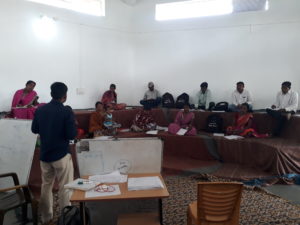
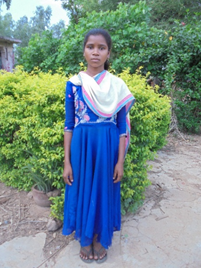 From the childhood, Sabitri Praska has lost her father. Two years back, she missed her mother while studying in Std. VII. Being an orphan child, Sabitri has to depend upon her elder brother and sister-in-law’s income from agricultural labour. In an ill-fated morning, she was asked by her brother and sister-in-law to support them in agricultural works and supplement to family income instead of continuing her education. As if the sky fell on her head when she was warned about stop going to school. Sabitri could not think beyond her schooling.
From the childhood, Sabitri Praska has lost her father. Two years back, she missed her mother while studying in Std. VII. Being an orphan child, Sabitri has to depend upon her elder brother and sister-in-law’s income from agricultural labour. In an ill-fated morning, she was asked by her brother and sister-in-law to support them in agricultural works and supplement to family income instead of continuing her education. As if the sky fell on her head when she was warned about stop going to school. Sabitri could not think beyond her schooling.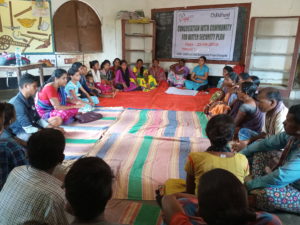 Emailguda being an operational village of CYSD’s Integrated Child Development Project, the villagers highlighted the water scarcity challenges before the programme team. As an initial step, involving the entire community, a Plan of water security, sanitation and garbage disposal was facilitated for the village.
Emailguda being an operational village of CYSD’s Integrated Child Development Project, the villagers highlighted the water scarcity challenges before the programme team. As an initial step, involving the entire community, a Plan of water security, sanitation and garbage disposal was facilitated for the village. Girls’ Education is the strategic development priority in CYSD’s Integrated Tribal (Child) Development Project interventions in both Keonjhar and Mayurbhanj districts of Odisha. The findings of different studies reflect that girls as compared to boys are disadvantaged and discriminated in education, health and other aspects. Most of the girls in tribal dominated programme areas are dropped out from the secondary schools due to various reasons, like they are compelled to do household chores and take care of their siblings in one hand and the distance between their houses and the schools, and lack of girls’ toilet facilities in school campus on the other.
Girls’ Education is the strategic development priority in CYSD’s Integrated Tribal (Child) Development Project interventions in both Keonjhar and Mayurbhanj districts of Odisha. The findings of different studies reflect that girls as compared to boys are disadvantaged and discriminated in education, health and other aspects. Most of the girls in tribal dominated programme areas are dropped out from the secondary schools due to various reasons, like they are compelled to do household chores and take care of their siblings in one hand and the distance between their houses and the schools, and lack of girls’ toilet facilities in school campus on the other. From10 targeted schools, 188 members of SMC – School Management Committee (including 78 female members) are oriented on Right to Education (RtE) Act and made aware about their roles and responsibilities, especially in designing school development plan, monitoring the school activities regularly with special focus on effective learning environment for girls at schools.
From10 targeted schools, 188 members of SMC – School Management Committee (including 78 female members) are oriented on Right to Education (RtE) Act and made aware about their roles and responsibilities, especially in designing school development plan, monitoring the school activities regularly with special focus on effective learning environment for girls at schools. In 10 schools of Thakurmunda block, CYSD has facilitated the renovation of separate toilets for girls, handwashing platforms and tube wells for drinking water purpose leveraging resources from the Block Administration. Around 1320 girls are using the upgraded Water Sanitation and Hygiene (WASH) facilities hassle-free.
In 10 schools of Thakurmunda block, CYSD has facilitated the renovation of separate toilets for girls, handwashing platforms and tube wells for drinking water purpose leveraging resources from the Block Administration. Around 1320 girls are using the upgraded Water Sanitation and Hygiene (WASH) facilities hassle-free.
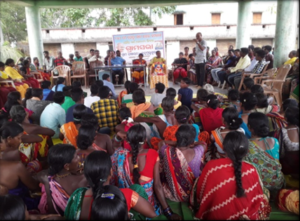 With the backdrop, CYSD’s Integrated Child Development Project in Mathili block of Malkanagiri district has identified some potential youth groups and is in the process of strengthening strong motivational bent of mindset among the groups to address critical societal issues towards ensuring the basic services, like drinking water and sanitation in the Block.
With the backdrop, CYSD’s Integrated Child Development Project in Mathili block of Malkanagiri district has identified some potential youth groups and is in the process of strengthening strong motivational bent of mindset among the groups to address critical societal issues towards ensuring the basic services, like drinking water and sanitation in the Block.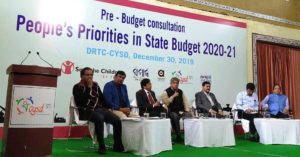
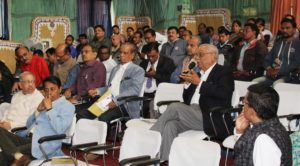 The commitment of 2.5 percent of GSDP by 2025 and 8 percent of State Budget by 2020 is on its half way (1.26 % of GDP and 4.9% of State Budget) needs substantial scaling up in public spending. The increase in budget allocation should take care of the infrastructure and facilities requirement of primary health care which includes health sub-centres, primary health centres and community health centres. The state may focus to bring village health maps to address the health needs effectively. With a target of five years, all the houses are covered with toilets in the State as declared by the Department of Drinking Water and Sanitation, GoI. Now we need to think of faecal sludge management in rural areas.
The commitment of 2.5 percent of GSDP by 2025 and 8 percent of State Budget by 2020 is on its half way (1.26 % of GDP and 4.9% of State Budget) needs substantial scaling up in public spending. The increase in budget allocation should take care of the infrastructure and facilities requirement of primary health care which includes health sub-centres, primary health centres and community health centres. The state may focus to bring village health maps to address the health needs effectively. With a target of five years, all the houses are covered with toilets in the State as declared by the Department of Drinking Water and Sanitation, GoI. Now we need to think of faecal sludge management in rural areas.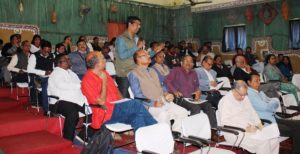 After a decade of implementation, the government have not been able to achieve all schools RtE compliance, particularly in addressing the quality education for all. A state level technical committee may be formed with proper resource support to assess the current situation and prepare a strategic road map to implement the provisions in the new education policy. In the current ICDS structure, the Anganwadi centre is more inclined towards delivery of supplementary nutrition programme with a little focus on pre-school education. A qualified person may be appointed for undertaking pre-school education activities.
After a decade of implementation, the government have not been able to achieve all schools RtE compliance, particularly in addressing the quality education for all. A state level technical committee may be formed with proper resource support to assess the current situation and prepare a strategic road map to implement the provisions in the new education policy. In the current ICDS structure, the Anganwadi centre is more inclined towards delivery of supplementary nutrition programme with a little focus on pre-school education. A qualified person may be appointed for undertaking pre-school education activities.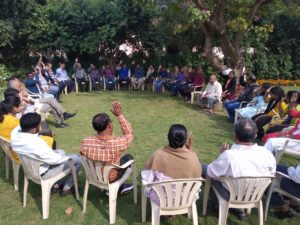 A four-day workshop was jointly organized by CYSD and the National Center for Advocacy Studies (NCAS) on “Localizing SDGs with a focus on Tribal Development” in Bhubaneswar with the objective to provide perspective building, analytical understanding, skill development and experimental learning around Sustainable Development Goals (SDGs) and local governance in the context of tribal development in India. The representatives from civil society organizations, practitioners, public policy analysts, and academic researchers, involved in governance and sustainable development are expected to be immensely benefitted from this capacity building workshop.
A four-day workshop was jointly organized by CYSD and the National Center for Advocacy Studies (NCAS) on “Localizing SDGs with a focus on Tribal Development” in Bhubaneswar with the objective to provide perspective building, analytical understanding, skill development and experimental learning around Sustainable Development Goals (SDGs) and local governance in the context of tribal development in India. The representatives from civil society organizations, practitioners, public policy analysts, and academic researchers, involved in governance and sustainable development are expected to be immensely benefitted from this capacity building workshop.